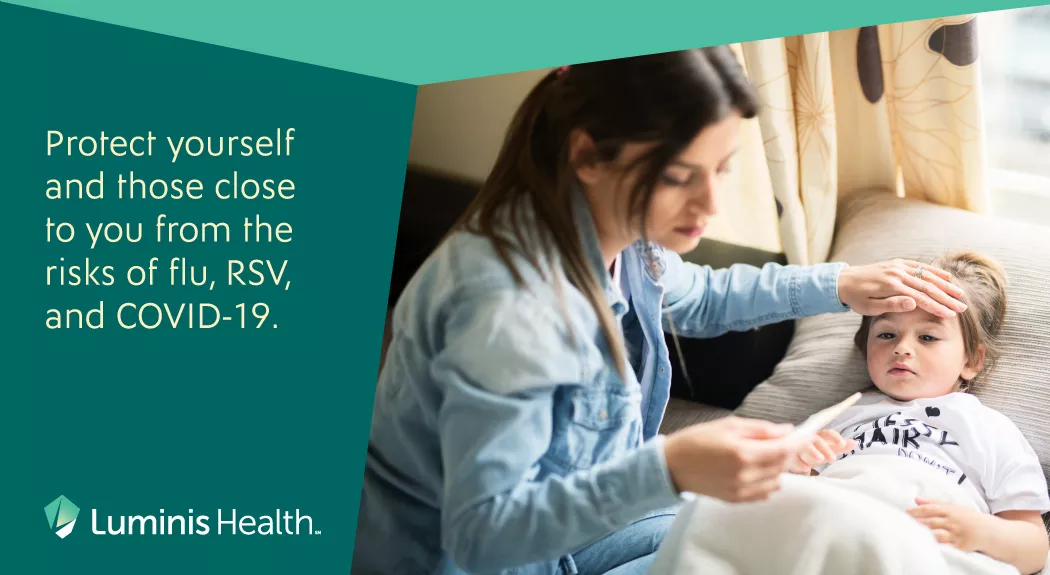Effective January 20, 2026, masks are encouraged for all staff, patients and visitors at all Luminis Health locations and will remain encouraged through the end of the influenza season. Thank you for your patience as we continue to care for our community.

At Luminis Health, your health matters to us every season of the year. In the fall and winter, staying vigilant about your health becomes paramount during the peak of respiratory illness season. During this period, the convergence of various respiratory infections, such as the flu, COVID-19, and RSV, underscores the importance of getting vaccinated.
If you want to increase your chances of staying healthy this winter, getting vaccinated is an easy step to take. Getting vaccinated will not only help keep you healthy but can help reduce the spread of illness to others, being admitted to the hospital or experiencing complications associated with these infections.
Who is at risk?
Flu, RSV and COVID-19 disease are all viruses. High-risk groups for all three viruses include, but are not limited to, adults over 65, very young children, and those with chronic conditions such as asthma, heart disease, neurologic issues, weakened immune systems, and obesity. Women who are pregnant may also be at risk.
About vaccines
Flu vaccines are available now, so get yours sooner rather than later. It takes two weeks for antibodies to be effective. The Centers for Disease Control and Prevention (CDC) recommends everyone six months and older receive a flu vaccine and an updated 2024-2025 COVID-19 vaccine each year, with rare exceptions. Vaccination is particularly important during pregnancy and for those at higher risk of serious complications. The flu can also cause pneumonia and complications that can lead to hospitalization and death.
You should receive the latest COVID-19 vaccine, even if you had the original series. Data from last season shows that those who received the 2023-2024 COVID-19 vaccine had better protection against illness and hospitalization compared to those who did not get vaccinated. You can get this at the same time as your flu shot.
Last year, the FDA approved the first RSV vaccines for everyone ages 75 and older, adults ages 60-74 who are at increased risk of severe RSV disease, and pregnant women 32 through 36 weeks’ gestation. The CDC recommends protecting infants younger than 8 months against severe RSV by either vaccination of a pregnant person or by the baby getting the antibody shot (nirsevimab), at birth or just before the RSV season. RSV, which typically causes mild, cold-like symptoms, can inflame the small airways of the lungs or cause pneumonia—which is a lung infection—in children younger than one year.
The CDC says that each year in the United States, an estimated 58,000 children younger than five years old are hospitalized due to RSV infection. Many people don’t realize that, in addition, approximately 177,000 older adults are hospitalized annually with RSV and 14,000 of them die — which highlights the importance of prevention.
When to get vaccinated
- Flu: It’s best to get vaccinated in the fall, as the respiratory virus season typically begins in October and peaks between December and March. Schedule your flu shot with Luminis Health today.
- COVID-19: The new 2024-2025 COVID-19 vaccine is available now.
- RSV: The RSV vaccine can be received at any time, but the CDC recommends getting it in late summer or early fall. Pregnant individuals should receive the RSV vaccine between weeks 32 and 36 of pregnancy, ideally between September and January. For infants, administration of antibodies is recommended from October through March.
What you can do
You’ve heard this before, but truthfully, these are the best ways to protect yourself from serious illness this fall:
- Wash your hands often.
- Keep your hands off your face.
- Avoid close contact with sick people.
- Cover your coughs and sneezes.
- Clean and disinfect surfaces.
- Stay home when you are sick.
In addition, experts agree that getting vaccinated will help keep you from being hospitalized for severe illness and will make more hospital beds available for those who really need them.
And if you do get sick, Luminis Health is here for you. You can connect with a Luminis Health medical provider on your mobile device from anywhere in the state — even the comfort of your home — with Luminis Health CareConnectNow. Visit LuminisHealth.org/CareConnectNow to schedule an appointment.
|
Illness |
Who is Eligible? |
When Should I get it? |
|
Flu |
Everyone six months and older |
September/October |
|
COVID |
Everyone six months and older |
Now |
|
RSV |
Adults age 75 or older and adult ages 60-74 who are at increased risk of severe RSV |
Late Summer/Early Fall |
|
RSV (pregnancy) |
Pregnant people during weeks 32 through 36 of pregnancy |
September through January |
|
RSV antibodies (Infants) |
Infants younger than 8 months |
October through March |



